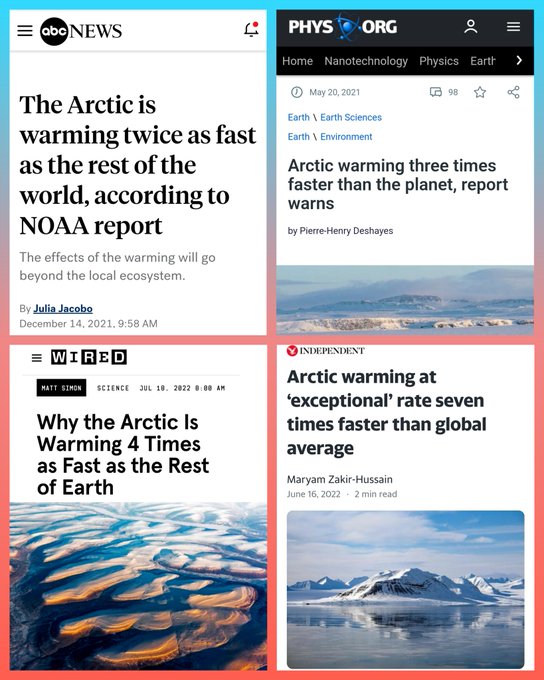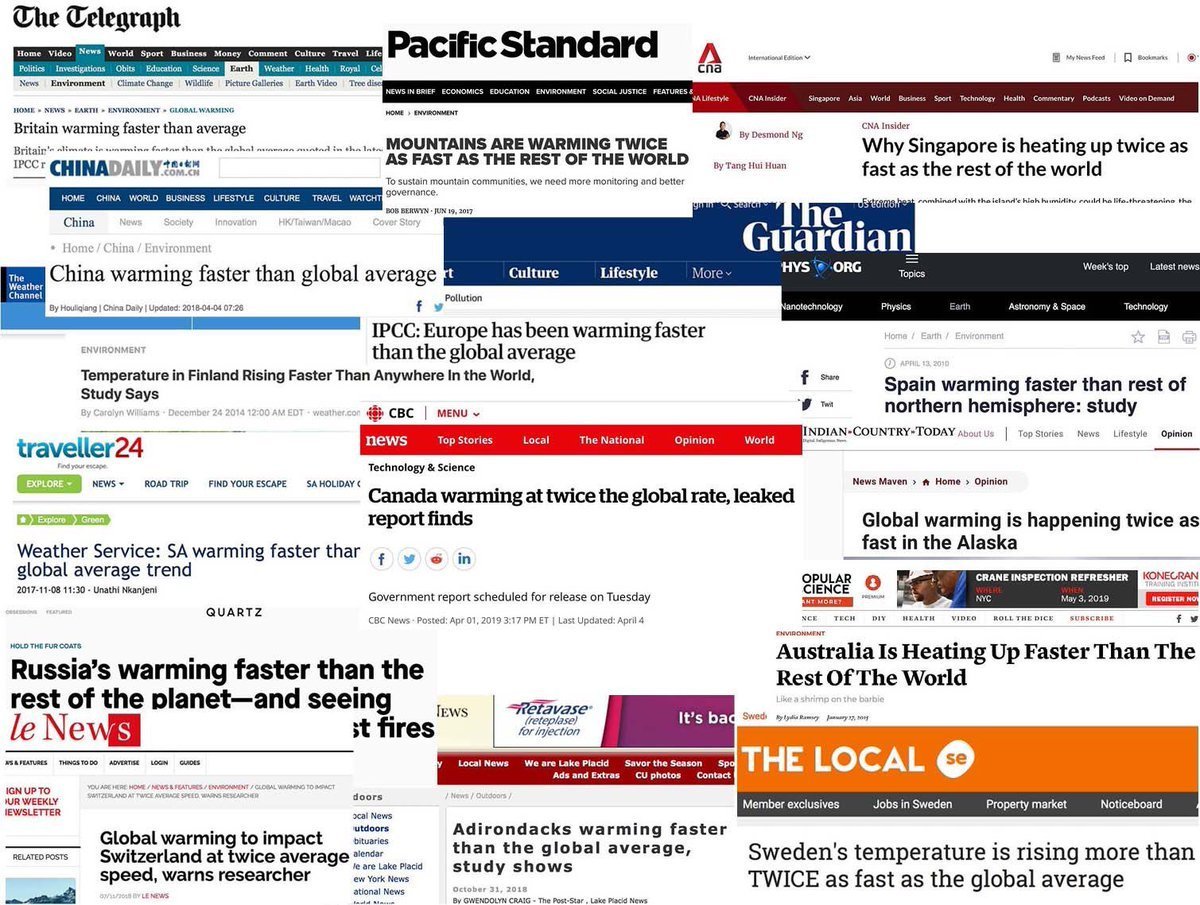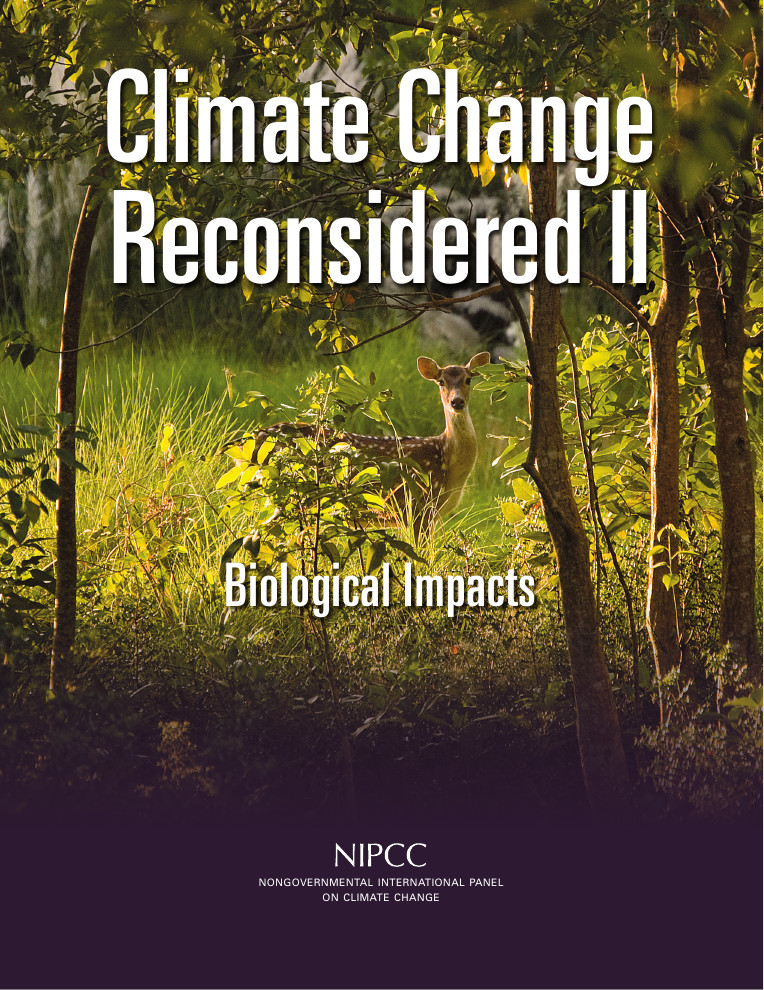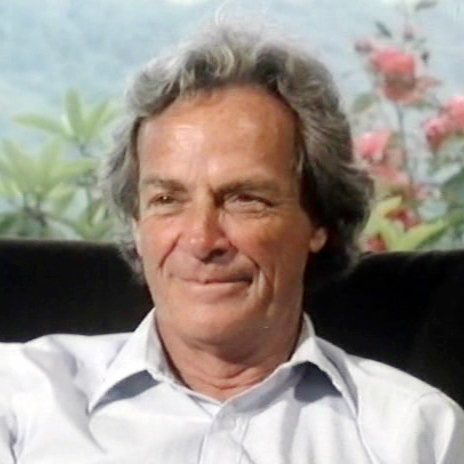Climategate in Review
|
|
||||||||||||||
Climategate in Review
|
|
||||||||||||||
"It seems to me that the widespread acceptance of the global warming
dogma has become one of the main, most costly and most undemocratic
public policy mistakes in generations. The previous one was communism."
— Vaclaw Klaus,
President of Czech Republic, October 19, 2010
One result of the Climategate scandal has been to make information and viewpoints skeptical of man-made climate Armageddon more readily available to the general public, through books and articles published in the main stream press. Here are a few sources of information presenting the case that there is far from sufficient data available to predict a coming worldwide disaster.
Certainly we can suspend skepticism and trust the media to perform due diligence as professional journalists and verify the facts before publishing:


Well, they couldn't print it if it wasn't true! As Tony Heller put it: "Every place on earth is warming twice as fast as every place else." [Video]
What types of catastrophes do the alarmists predict will be caused by global warming? Here is a site maintained by John Brignell, that provides links to articles discussing the dire consequences. Although the list does not appear to be currently updated, it is still quite fascinating.
Richard Lindzen, an atmospheric physicist at MIT, makes a calm and well reasoned presentation concerning the groups involved in the climate debate, in this short five minute clip.
Anthony Watts presents a 53 minute talk that discusses ten issues that should be considered when evaluating the claims concerning Anthropogenic Global Warming.
The Malaysian astrophysicist Dr. Willie Soon gives a 38 minute presentation in which discusses the current anti-science approach towards much of contemporary climate research, and demonstrates the complete uselessness of the current computer climate models.
Geologist Ian Plimer, author of Heaven and Earth, summarizes his findings regarding earth changing climate to the UK government in this 15 minute video:
And in the following 44 minute video, Plimer further discusses why the approach taken by the climate political activists, along with much of media reporting and current education, are anti-scientific.
The Maldives is a country located on a set of atolls in the Arabian Sea, southwest of the southern tip of India. As the country with the lowest elevation — typically just one meter above sea level — it has repeatedly been used as global warming's canary-in-the-coal-mine, predicted to soon be under water and uninhabitable due to rising sea levels. In 1988, it was predicted to be submerged in 30 years. 2018 came and went and the Maldives are doing just fine. Not to be stopped by so small a problem, more predictions followed. The author of the eight-minute video questions why the population and investment in the Maldives continues apace despite the stated risks. He awaits an answer.
Here is another longer (49 minute) video by a former NOAA meteorologist, David Dilley, that discusses the Earth's historical temperature cycles which help to more properly interpret the changes occurring during the 20th and 21st centuries.
This is a five minute presentation by Patrick Moore, a co-founder of the environmentalist group Greenpeace. who has since left and distanced himself from the group due to their taking "a sharp turn to the political left," evolving "into an organization of extremism and politically motivated agendas" and abandoning "science and logic in favor of emotion and sensationalism."
In this video, Moore discusses how the earth's climate has and always will be in a constant state of change independent of human activity, while pointing out that climate science is definitely not settled.
Here is Micheal Crichton's 10 minute congressional testimony where he points out how politics perverts research by willingly bypassing the well established checks used in science to validate results.
In this one hour (first half of video) 2013 talk Micheal Crichton expands on the research that he did on the willingness of media to report catastrophic but false information in lieu of any verifiable scientific data, leading him to write the novel State of Fear. His observations have profound implications for events that we have since experienced.
2022 Nobel prize physicist John Clauser gives his views on the lack of reliable science in the "climate crisis" field (14 minutes).
Naomi Seibt is interviewed by Alex Epstein. She makes the point that she is a climate realist and not a skeptic because she has no political agenda and is only interested in the science (1 hour).
A new documentary (2023), Climate: The Movie, puts the current question regarding global temperature into a proper historical context. It next examines the question of the correlation between carbon dioxide levels and temperature, followed by the influence of clouds and sun. The issue of increasing "extreme weather" is explored, showing it to be non-existent. Finally the politicization of science is explored with the consequences of censorship used against those who refuse to conform to the "official" narrative.
The following is a comprehensive (as of 2014) reference published on the Popular Technology website that lists:
1350+ Peer-Reviewed Papers Supporting Skeptic Arguments Against ACC/AGW Alarmism
including a section that provides rebuttals to a number of the most common responses in support of Anthropogenic Global Warming.
Here is a link to a very interesting 2015 article written by David Siegel, a self described vegan, Democrat, and firm believer in Al Gore's message, who was challenged by a friend to question his assumptions on climate change. Being an honest investigator, he describes the evidence he confronted which modified his opinion on the subject.
What I Learned about Climate Change: The Science is not Settled
This short article by the award-winning environmentalist Michael Shellenberger is an honest account of how environmental science has been politicized and turned into a weapon to create unwarranted fear of a pending climate catastrophe. Further details can be found in his book: Apocalypse Never: Why Environmental Alarmism Hurts Us All
On Behalf Of Environmentalists, I Apologize For The Climate Scare
Patrick Moore, one of the original founders of the environmental activist organization Greenpeace, split with that group in 1986 due to its sharp swing to the political left and it's increasingly politically motivated agenda. Since then, he has often been critical of many of the claims made by environmentalists over their anti-scientific claims and biases. On March 9th, 2019, he had this to say:
"No genuine scientist would ever ridicule skepticism.
It is one of the defining features of an inquisitive mind.
No genuine scientist would use the word 'denier' to describe
another scientist.
No genuine scientist would claim a compute model is able to
predict future climates. QED"
Anthony Watts is a former meteorologist who runs the Watts Up With That? website, reporting on climate issues from a skeptic's viewpoint. Watts also provides links to a variety of other pro- and skeptic sites discussing anthropogenic global warming.
JoNova is a freelance science writer who maintains a website reporting on current events in the climate science field. She has summarized many climate facts in two short pamphlets titled The Skeptics Handbook, I and II.
In an article on the Forbes website titled Denying the Catastrophe: The Science of the Climate Skeptic's Position, Warren Meyer provides a brief overview of some of the sound reasons for dismissing alarmist claims over climate change. This article is a summary of a more detailed video presentation available at his Climate Skeptic website.
In a talk entitled Climate Models Go Cold, reproduced in the Financial Post, engineer David Evans explains how the original idea that carbon dioxide production was predominantly responsible for the earth's global warming was based upon a climate model hypothesis formulated in the 1960s, which by the mid 1990s had been completely disproved by three decades of temperature measurements.

|
|
The Heartland
Institute has published an updated, peer-reviewed report on
the hard science behind the climate change alarmists' claims.
Physical Science: [Executive Summary] — [Full Report] — [PDF] Biological Impacts: [Executive Summary] — [Full Report] — [PDF] |
The Physical Science report covers:
The Biological Impacts report covers:

|
|
For people who wish to get a more comprehensive overview of the issues impacting the climate change debate, I highly recommend reading Ian Plimer's book: |
Plimer is a geologist who presents a comprehensive history of the earth's climate, explaining exactly what we know and do not know about factors influencing it. In his heavily researched book, he brings together information from a number of scientific disciplines (there are over 2,300 footnote references) to present a comprehensive picture that sheds real light on issues related to the current climate change debate. He demonstrates the following:
There is a lot more to this book and it is a fascinating read just for the education that you will gain into the current state of sciences relating to the earth, atmosphere, oceans, glaciers and sun. But the important issue here is that no one who has not read this book and is ready to address the issues it raises, should be making any pronouncements regarding climate change — let alone passing legislation that will affect the lives of us all.
Read it, and then write to the President and your congressional representatives and demand that they too read this book and demonstrate a real knowledge of the science behind global warming before casting an uninformed vote on this issue. Of course, be prepared for them to ignore this request, because the real political goal behind the IPCC and the push to regulate CO2 has nothing to do with scientifically-based environmental concerns, and everything to do with the further consolidation of power in the hands of governments seeking nothing less than total control over every aspect of their subjects' lives.
Here is a quick summary of some of his more interesting points. Read the article for the details.

|
|
In 1974, the distinguished physicists and Nobel Prize winner, Richard Feynman, gave the commencement address to the graduates of Caltech, cautioning them about self-deception being one of the most serious ways to undermine scientific integrity. Some Remarks On Science, Pseudoscience, And Learning How To Not Fool Yourself |
Here are a few excerpts from the speech. First, Feynman speaks about various pseudo-sciences and categorizes them as Cargo Cults.
"In the South Seas there is a Cargo Cult of people. During the war they saw airplanes land with lots of good materials, and they want the same thing to happen now. So they've arranged to make things like runways, to put fires along the sides of the runways, to make a wooden hut for a man to sit in, with two wooden pieces on his head like headphones and bars of bamboo sticking out like antennas—he's the controller—and they wait for the airplanes to land. They're doing everything right. The form is perfect. It looks exactly the way it looked before. But it doesn't work. No airplanes land. So I call these things Cargo Cult Science, because they follow all the apparent precepts and forms of scientific investigation, but they're missing something essential, because the planes don't land."
Why don't the South Sea natives—and the pseudo-scientists—recognize and acknowledge that their failure to produce results is a clear sign that something is wrong? Feynman argues that it arises from a lack of scientific integrity.
"Now it behooves me, of course, to tell you what they're missing.
[...] It's a kind of scientific integrity, a principle of
scientific thought that corresponds to a kind of utter
honesty—a kind of leaning over backwards. For example,
if you're doing an experiment, you should report everything that
you think might make it invalid—not only what you think is
right about it: other causes that could possibly explain your
results; and things you thought of that you've eliminated by some
other experiment, and how they worked—to make sure the other
fellow can tell they have been eliminated.
"Details that could throw doubt on your interpretation must be
given, if you know them. You must do the best you can—if
you know anything at all wrong, or possibly wrong—to explain
it. If you make a theory, for example, and advertise it, or put
it out, then you must also put down all the facts that disagree
with it, as well as those that agree with it. There is also a
more subtle problem. When you have put a lot of ideas together
to make an elaborate theory, you want to make sure, when
explaining what it fits, that those things it fits are not just
the things that gave you the idea for the theory; but that
the finished theory makes something else come out right, in
addition.
[emphasis added]
"In summary, the idea is to try to give all of the information to
help others to judge the value of your contribution; not just the
information that leads to judgment in one particular direction
or another."
[...]
"The first principle is that you must not fool yourself—and
you are the easiest person to fool. So you have to be very careful
about that. After you've not fooled yourself, it's easy not to
fool other scientists. You just have to be honest in a
conventional way after that.
"I would like to add something that's not essential to the science,
but something I kind of believe, which is that you should not fool
the layman when you're talking as a scientist. [...] I'm talking
about a specific, extra type of integrity that is not lying, but
bending over backwards to show how you're maybe wrong, that you
ought to do when acting as a scientist. And this is our
responsibility as scientists, certainly to other scientists, and I
think to laymen."
Now, consider all of this in relation to how climate science is being handled by so many in the profession. The secrecy. The unwillingness to share raw data, let alone methodology. Making ex cathedra proclamations while denouncing all who disagree, and then claiming (falsely) that the "science is settled" without having even attempted to meet any of the criteria that Feynman discusses!
Feynman was speaking in 1974, so the lack of scientific integrity has been a long standing problem. However, with the politicization of science as we see it in the climate arena, the abuses resulting from this failure are being magnified and the consequences to everyone are widespread and dire.
in response to the massive manipulated narrative being pushed by governments, institutions and the media, thoughtful scientists have begun to respond in a coordinated effort. The Global Warming Petition Project was organized in order to allow individuals to register their disagreement with the conjecture that a global warming catastrophe looms on the horizon or that CO2 is a significant contributor to said catastrophe.
As of September 23, 2023, approximately 31,500 scientists have signed the petition, including over 9,000 with PhDs. So much for "scientific consensus!"

|
|
This humorous image has been circulating on the internet and upon
seeing it, a geologist friend commented:
"This is exactly how a geologist sees 'global warming'." In the spirit of "a picture is worth a thousand words," I thought that this image and comment did an excellent job of summarizing the skeptic's viewpoint on the issue of climate change. When viewed in the broadest perspective, it becomes clear that what we are observing today is nothing more than the natural dynamic nature of earth's ever-changing climate, subject to myriad factors. Yes, industrialization may play some role in affecting climate, but it is a minor component in relation to other factors such as the cyclic nature of the sun's output. |
| Back up to: |
|
Index |
|
|
||
| Next Section: |
|
Other Climate Review Websites |